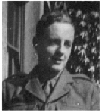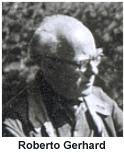| 1950-53 |
25 July: At Blackdown
during the last days of his National Service, hears Radio France's live relay
of the European premiere of Messiaen's Turangalîla
Symphony, conducted by Hans Rosbaud in Aix-en-Provence, and is astounded.

August: End of
National Service. Returns to Campbeltown still in uniform, with a view to a
year's Territorial Army Service which mercifully never materialises.
Peterhouse, Cambridge
University, ostensibly reading for honours degree in History and English,
privately concentrating on further attempts at composition, stimulated by
weekly informal meetings with Roberto Gerhard. In History is supervised,
influentially, by Dennis Mack Smith, and also by Brian Wormald, both of whom
are keen music-listeners - as is John Kendrew(1917-97) , the molecular
biologist (and later Nobel-prize winner) whose rooms are adjacent to D's. In
the English faculty by far the most important influence is - or rather will be,
post- graduation, when all his books are acquired - that of F.R.Leavis
(and to some extent his Scrutiny circle, including the critic and
composer Wilfrid Mellers). Although Leavis and his wife are neighbours
and friends of the Gerhards, two brief meetings and a handful of unforgettable
lectures are the sum total of personal contacts - one of the many missed
opportunities of the Cambridge years. Not missed are the film-club programmes.
An interest is film music has been growing for some years, and is greatly
intensified by reading Eisler's and Adorno's Composing for the Films,
published by Dennis Dobson in 1947. (Hopes of studying composition, either in
Germany or, by some miracle, in the USA, will survive for seven years.)
Informal links with the music
faculty are preserved by constant (almost daily) visits to the faculty Library,
for study purposes and for the pleasure of discussions with its librarian,
Charles Cudworth. Further important links with the faculty come about
through musical friendships - notably with the postgraduate research student
Nigel Fortune, a specialist in the history of Italian monody, and a keen
amateur of 20th century music. Other influential friendships with undergraduate
composers - David Farquhar, Nigel Glendinning, Ian Kemp, and
Nigel Davison. Meanwhile, the counter-attractions of musical life in London are
recommended by the maverick publisher Dennis Dobson, an ardent supporter
of New Music, a capable pianist, and a trusty friend.
|
| 1951 |
March: [?] Obtains
advance notice of a performance of the Schoenberg Piano Concerto with Peter
Stadlen as soloist, to be given at the BBC's Maida Vale studios. Writes to
Gerhard from Scotland suggesting they both attend the performance -
which they do. Afterwards, a taxi-ride with Gerhard, Stadlen, and Erwin Stein;
awestruck by discussion of what the three should put in a congratulatory
telegram to the ailing Schoenberg. For the rest of the decade, is a
habitué of the Maida Vale studios for a wide range of contemporary music
concerts and recordings. Becomes acquainted with Constant Lambert during the
last months of his life, and in July 1951 attends two performances of his
ill-fated ballet Tiresias.
June: First visit to
mainland Europe (Belgium, Germany) together with Tom Bransten, an
American friend from Cambridge. With Gerhard and his wife Poldi, attends
the ISCM Festival in Frankfurt, and, at the opera house in Wiesbaden, the
German premiere (concert performance) of Gerhard's opera The Duenna. In
Darmstadt as part of the same festival, attends the world-premiere of
Schoenberg's Dance round the Golden Calf. Meets (among others) H.H.
Stuckenschmidt and Hans Werner Henze.
Early winter: First
contacts with Donald Mitchell and Hans Keller. A letter addressed
to them as Editors of the quarterly review Music Survey is
sympathetically edited by Keller and will be published in the February 1952
issue.
|
| 1953 |
10/12 April:
Absenting himself from Cambridge (regardless of exams), D attends rehearsals of
Messiaen's Turangalîla symphony at the BBC Symphony
Orchestra's Maida Vale studio, followed by the UK premiere at the Royal
Festival Hall. The conductor is Walter Goehr; the work is vilified by most of
the London press. D is introduced to the composer by Felix Aprahamian.
May: Graduation, with
(poor) 2nd class honours. |

